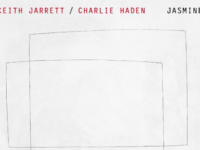Keith Jarrett has performed and recorded with his Gary Peacock/Jack DeJohnette trio for so long that it’s easy to forget that the pianist had led other trios at other times. Indeed, his triad with Charlie Haden (bass) and Paul Motian (drums) went all the way back to Jarrett’s Charles Lloyd days in 1966. This great trio ended only when it became a great quartet after the entrance of reedman Dewey Redman in 1971.
Hamburg ’72 captures live a radio concert made in the midst of a 1972 European tour arranged by ECM Records, and Mr. ECM himself Manfred Eicher mixed the tapes with Jan Erik Kongshaug this past summer, culminating in these recordings to finally see the light of day on November 25, 2014.
The album (from ECM Records) comes at one of Keith Jarrett’s most interesting periods. He had left Miles Davis’ fusion band roughly six months earlier, an experience that made him determined to go in the opposite direction musically. Everything he had done over the rest of the 70s seemed to be a quest to show that jazz didn’t need rock and its plugged-in instruments in order to progress, Expectations notwithstanding.
During what was probably the last tour of the three without Redman, Hamburg ’72 is Jarrett at his most multi-faceted, easily pivoting among playing styles, idioms, even instruments. He remains a masterful performer but no where near as unpredictable as he was during this time; other than rock-jazz fusion, few things were off limits. Moreover, this was a time where he frequently used his own pen to pursue these various avenues.
Haden and Motian, two recent entrants into jazz heaven, made for one hell of a rhythm section. A decade earlier they helped Ornette Coleman and Bill Evans re-write the rules of jazz, coming from polar opposite directions. Together, they find much common ground as fellow subversives and innovators on their respective instruments.
Keith Jarrett, keenly aware of the talent at his disposal, touches on both the rich melodicism of Evans and the uninhibited harmonics of Coleman at various times.
“Rainbow,” composed by his first wife Margot, is spun with a pretty melody on solo piano before Motian signals the start of swing. There’s gorgeous piano playing, notes just spill out in rich natural cadence. Motian rides a cymbal with a lot of spacing in a way that no one else does. The two settle down just long enough for one of Haden’s earthy solos. Jarrett wraps things up on solo piano, too, but with halting, strident chords.
Jarrett’s “Piece For Ornette” is pretty out there, just as the title tips us off that it would, but that’s because of Jarrett’s soprano sax, not piano. However, his horn is also bop-based even when it gets a little skronky, and Haden keeps the whole thing well anchored, anyway. Motian gets increasingly explosive and spurs Jarrett to go even further out. After a hard-thrumming solo by Haden, the trio transitions right into “Take Me Back” one of Jarrett’s folky-funky melodies. Motian adapts his technique to this un-jazzy song very effectively, pointing the way forward for his own solo work in the coming years that didn’t always stay within the lines of jazz.
Jarrett also plays flute, for “Everything That Lives Laments.” He’s not content to play that instrument in a conventional manner, either: at one point he sings and plays flute at the same time. “Life, Dance” is the only brief tune played and is interesting in that the melody is very dulcet but the three play it rhythmically free.
The set concludes with the only non-Jarrett tune, Haden’s signature piece “Song For Che.” It’s a song meant to be played with pure emotion not to end until the emotion is expended, and here it takes fifteen minutes. It starts, appropriately enough, with Haden playing his tone poem. Motian and Jarrett provides a vaguely Latino backdrop with percussion, but the clouds gather as Motian retires to the drum set and Jarrett gets on soprano sax to perform some tension release. And then, dramatic flourishes on piano. The song returns to its humble beginnings with Haden up front and percussion backing from the other two.
As a witness to a talent that was in the process of exploding in many directions, Hamburg ’72 is no redundant, vault-clearing release. This is an important document of Keith Jarrett bringing his first great trio to a peak. The only way forward after this was to do so with an extra voice.




Nice review!
Two small details: first, you refer to the “great trio” of Jarrett/Haden/Motian becoming a “great quintet” with the addition of Dewey Redman when, of course, it should read “great quartet.”
The other thing is that, while this 1972 European tour was booked as a trio by ECM’s Manfred Eicher (perhaps for financial reasons, but that’s just supposition), it had already become a quartet in the United States, with two albums – El Juicio (The Judgement) and Birth – already released on Atlantic the previous year. So I would respectfully argue that Hamburg ’72 doesn’t at all demonstrate that “the only way forward was…to do so with an extra voice”; rather, it demonstrated that whether in trio or quartet, the trifecta of Jarrett, Haden & Motian was a potent force with which to be reckoned.
But these are small quibbles. I’m glad to see that you enjoyed the record as much as I did!!!
Best!
John
Thanks for your thoughtful feedback, John. I fixed my quartet/quintet confusion (heh) accordingly.
I was aware that the trio concert occured after Redman has already joined and recorded with the group, so I found it odd that he wasn’t with them for the 1972 European tour. But your theory as to why makes a lot of sense; it always comes down to money doesn’t it?
Appreciate your props, especially as it’s coming from someone who really knows his jazz!
Regards,
Victor